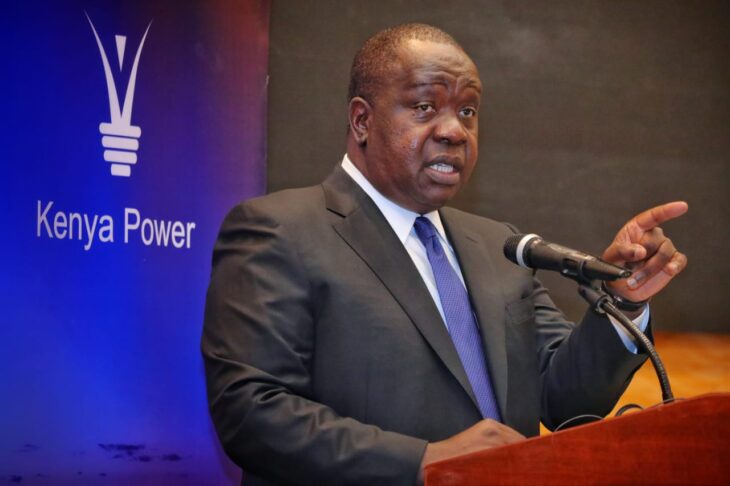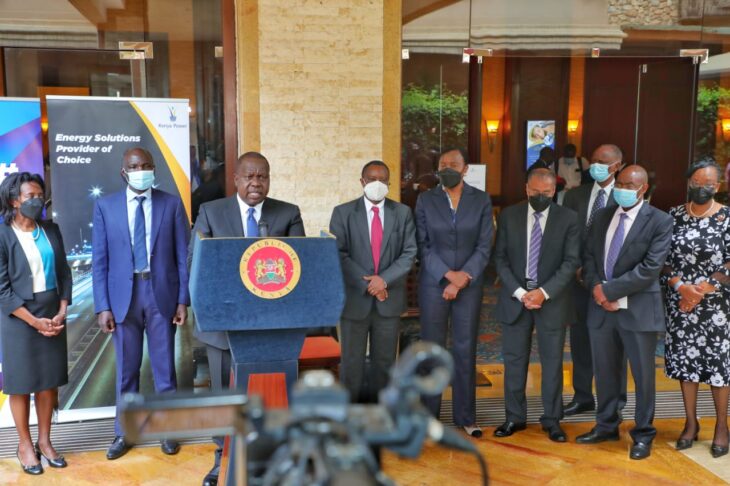NAIROBI, Kenya, Oct 7- The Government has frozen the contracting of additional independent power producers and ordered the Kenya Power and Lighting Company (KPLC) to review the existing Power Purchase Agreements (PPAs) to lower the cost of electricity in the country.
Interior Cabinet Secretary, Fred Matiang’i, said the decision was in line with the recommendations of the Presidential Task Force on the Review of PPAs entered into by KPLC following widespread concerns of high electricity bills.
“We are all concerned about the cost of power. Our bills are too high, and we have taken tough decisions to deal with challenges in this sector with the focus being the bringing down of the cost of power,” he said.
He was speaking after a meeting the KPLC Board, the company’s senior management team, and officials from the Ministry of Energy. The CS revealed that the Government had declared KPLC a “Special Project” and an inter-ministerial team set up to audit and oversight the power-distributor urgently.
He said, “We are going to do a forensic audit of some of our systems and procedures at KPLC. We are working jointly at an inter-ministerial level to reduce the system losses including the theft of power. We will address all challenges that result in passing unnecessary costs to consumers.”
A multi-agency team comprising of the DCI, Financial Reporting Center (FRC), Assets Recovery Authority and other investigative agencies will be assembled to investigate alarming system losses within KPLC, procurement practices, insider trading, conflict of interests and suspect transactions involving KPLC staff and others, he said.
For a while, KPLC has been running at a loss, with all indicators pointing to ineffective Power Purchase Agreements (PPAs) that have left the company heavily indebted while ironically paying for excesses energy it does not need in take-or-pay arrangements blamed on poor negotiations and vested interests.
Besides high fixed capacity charges amounting to Kshs. 47 billion, the PPAs are bound by Commercial Operation Dates (CODs) that are not aligned with the company’s power demand. This has often resulted in excess power generation even when the demand is low.
In the 2019/2020 Financial year, KPLC posted a loss before tax of Sh7 billion. Its negative working capital position for the fourth consecutive year has also raised substantial doubt about its ability to sustain operations.
The system losses stood at 23.47 percent, exceeding the 19.99 percent limit approved by the Energy and Petroleum Authority (EPRA). This is attributed to a lack of internal control measures put in place to mitigate losses including governance.
The company’s obligations to pay for goods and services that were acquired from suppliers were also not met with a long outstanding balance of Sh1.3 billion resulting in discontentment of financiers and suppliers.
Further, the company did not submit to the Unclaimed Financial Assets Authority Kshs.1.2 billion of deposit refunds to consumers, unidentified receipts, unpaid customer electricity deposits, unpaid wayleaves compensation, and unclaimed dividends and stale cheques as required by the Unclaimed Financial Assets Act 2011.
Matiang’i exuded confidence that the proposed changes will yield the much-desired results and assured Kenyans that the unit cost of electricity billed to clients will soon go down.
He was accompanied by Principal Secretaries, Gordon Kihalangwa and Julius Muya, KPLC Board Chair Vivian Yeda, and Ag. KPLC Managing Director Rosemary Oduor.
Want to send us a story? Contact Shahidi News Tel: +254115512797 (Mobile & WhatsApp)



